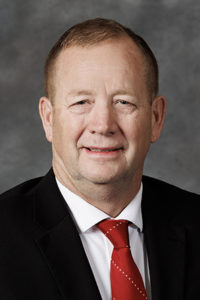Funds sought for northeast Nebraska water project
A state fund would be tapped to address drinking water and infrastructure needs in rural northeast Nebraska under a bill considered by the Appropriations Committee March 14.

LB768, sponsored by Niobrara Sen. Barry DeKay, would transfer $30 million from the state’s Cash Reserve Fund to the Critical Infrastructure Facilities Cash Fund under the state Department of Natural Resources by Jan. 1, 2024.
DeKay said he would bring an amendment to expand the legal uses of the fund so that it could be used for an ongoing water project in Cedar and Knox counties. Under current law, the fund is limited to protecting military installations and repairing collapsed irrigation tunnels.
The Legislature appropriated $7 million in American Rescue Plan Act funds to the project last year, DeKay said, and $30 million would allow its completion. The water project remains the area’s most critical issue, he said, as the current water treatment plant has outlived its useful life and is costly to operate and troubled by sedimentation problems within the intake structure.
“The quality and quantity of water is the most critical issue facing Nebraska, second only to the attraction and retention of people,” DeKay said. “Both must be addressed if we are to remain viable in the future.”
Annette Sudbeck, manager of the Lewis and Clark Natural Resources District, testified in support of the proposal on behalf of the NRD and the Nebraska Association of Resources Districts. The project would change the source water for the area, she said, and upgrade systems.
The Cedar Knox Rural Water Project provides drinking water in an area where finding groundwater resources is difficult, she said, and all options for a new water source are being explored.
“The project goal is to develop a groundwater wellfield, replace the undersized, outdated treatment plant in a more accessible area and replace portions of the distribution system that are undersized,” Sudbeck said.
Don Blankenau, a Lincoln attorney specializing in water law, testified in support of LB768. High-quality water in the Lewis and Clark NRD is not readily available, he said.
“No matter which option the NRD ultimately selects, the cost to rural Nebraskans served by the project will be significant,” Blankenau said. “Protecting and growing all parts of Nebraska requires an investment in all parts of Nebraska.”
Area landowner Rita Wilken testified against the bill, saying the potential project site is not the right location. It is near one of the largest cattle feeding operations in Knox County, she said, and two hog confinements and a chicken egg-laying farm are within a few miles of the proposed groundwater well sites.
Also speaking in opposition was Patricia Kronberg, who lives in the Lewis and Clark NRD area. Kronberg said she and her husband have lived on their land for 48 years and are concerned that groundwater wells for the project will affect their family’s well water — destroying the land value.
“We’re thinking about our kids, our grandkids,” she said. “They always come to grandpa and grandma’s house to play on the farm and we want to keep it in the family.”
The committee took no immediate action on LB768.

